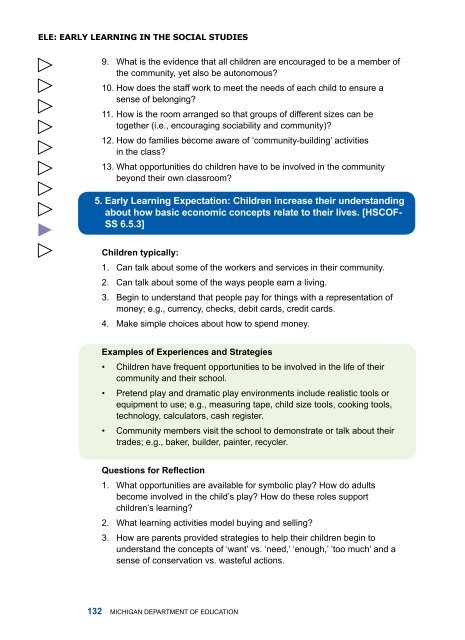Early Childhood Standards of Quality for ... - State of Michigan
Early Childhood Standards of Quality for ... - State of Michigan
Early Childhood Standards of Quality for ... - State of Michigan
You also want an ePaper? Increase the reach of your titles
YUMPU automatically turns print PDFs into web optimized ePapers that Google loves.
ELE: EARLY LEARNING IN THE SOCIAL STUDIES9. What is the evidence that all children are encouraged to be a member <strong>of</strong>the community, yet also be autonomous?10. How does the staff work to meet the needs <strong>of</strong> each child to ensure asense <strong>of</strong> belonging?11. How is the room arranged so that groups <strong>of</strong> different sizes can betogether (i.e., encouraging sociability and community)?12. How do families become aware <strong>of</strong> ‘community-building’ activitiesin the class?13. What opportunities do children have to be involved in the communitybeyond their own classroom?5. <strong>Early</strong> Learning Expectation: Children increase their understandingabout how basic economic concepts relate to their lives. [HSCOF-SS 6.5.3]Children typically:1. Can talk about some <strong>of</strong> the workers and services in their community.2. Can talk about some <strong>of</strong> the ways people earn a living.3. Begin to understand that people pay <strong>for</strong> things with a representation <strong>of</strong>money; e.g., currency, checks, debit cards, credit cards.4. Make simple choices about how to spend money.Examples <strong>of</strong> Experiences and Strategies• Children have frequent opportunities to be involved in the life <strong>of</strong> theircommunity and their school.• Pretend play and dramatic play environments include realistic tools orequipment to use; e.g., measuring tape, child size tools, cooking tools,technology, calculators, cash register.• Community members visit the school to demonstrate or talk about theirtrades; e.g., baker, builder, painter, recycler.Questions <strong>for</strong> Reflection1. What opportunities are available <strong>for</strong> symbolic play? How do adultsbecome involved in the child’s play? How do these roles supportchildren’s learning?2. What learning activities model buying and selling?3. How are parents provided strategies to help their children begin tounderstand the concepts <strong>of</strong> ‘want’ vs. ‘need,’ ‘enough,’ ‘too much’ and asense <strong>of</strong> conservation vs. wasteful actions.132 <strong>Michigan</strong> Department <strong>of</strong> Education


